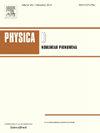用于混沌控制的kan增强深度强化学习:通过小扰动实现快速稳定
IF 2.9
3区 数学
Q1 MATHEMATICS, APPLIED
引用次数: 0
摘要
基于混沌系统具有密集周期轨道的特点,以OGY方法为代表的混沌控制方法以较小的控制输入成功地实现了系统的镇定,具有低能耗和非侵入性等优点。然而,这些方法严重依赖于轨迹填充混沌吸引子所需的时间,并且需要预先了解目标状态附近的局部动态信息。这些问题阻碍了它们的实际应用。在本文中,Kolmogorov-Arnold网络(KANs)通过深度强化学习显示出巨大的混沌控制潜力,这是最近提出的一种神经网络架构。提出了一种新的深度强化学习算法——参数化分支决斗q网络(P-BDQ)。然后,设计了一种基于KANs和P-BDQ的新型控制器。该控制器保留了OGY方法的优点,同时通过在每个迭代步骤施加适当的扰动来减少稳定时间。此外,深度强化学习的数据驱动特性避免了在稳定状态附近对局部系统动力学进行显式建模的需要。仿真结果表明,该控制器能有效地控制多个混沌系统。本文章由计算机程序翻译,如有差异,请以英文原文为准。
KAN-enhanced deep reinforcement learning for chaos control: Achieving rapid stabilization via minor perturbations
Based on the fact that chaotic systems own dense periodic orbits, chaos control methods represented by the OGY method successfully achieve stabilization with minor control inputs, offering advantages of low energy consumption and non-invasiveness. However, these methods heavily depend on the time required for trajectories to populate chaotic attractors and require prior knowledge of local dynamic information near the target state. These issues hinder their practical applications. In this paper, Kolmogorov–Arnold Networks (KANs) are demonstrated to exhibit significant potential for chaos control via deep reinforcement learning, which is a neural network architecture proposed recently. A new deep reinforcement learning algorithm called parametrized branching dueling Q-network (P-BDQ) is proposed. Then, a new controller is designed based on KANs and P-BDQ. This controller preserves the advantages of the OGY method while reducing the stabilization time through appropriate perturbations applied at each iteration step. Additionally, the data-driven property of deep reinforcement learning avoids the need for explicit modeling of the local system dynamics near a stable state. Numerical simulations demonstrate that this controller performs effectively across multiple chaotic systems.
求助全文
通过发布文献求助,成功后即可免费获取论文全文。
去求助
来源期刊

Physica D: Nonlinear Phenomena
物理-物理:数学物理
CiteScore
7.30
自引率
7.50%
发文量
213
审稿时长
65 days
期刊介绍:
Physica D (Nonlinear Phenomena) publishes research and review articles reporting on experimental and theoretical works, techniques and ideas that advance the understanding of nonlinear phenomena. Topics encompass wave motion in physical, chemical and biological systems; physical or biological phenomena governed by nonlinear field equations, including hydrodynamics and turbulence; pattern formation and cooperative phenomena; instability, bifurcations, chaos, and space-time disorder; integrable/Hamiltonian systems; asymptotic analysis and, more generally, mathematical methods for nonlinear systems.
 求助内容:
求助内容: 应助结果提醒方式:
应助结果提醒方式:


